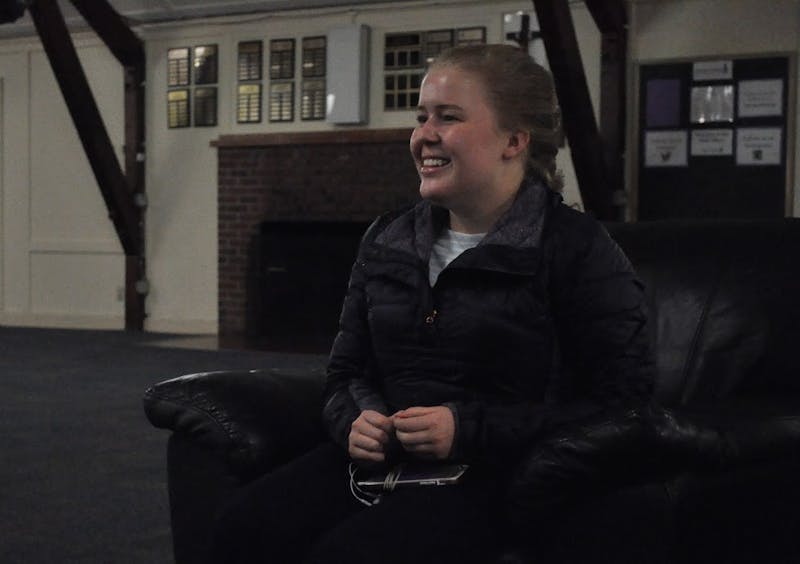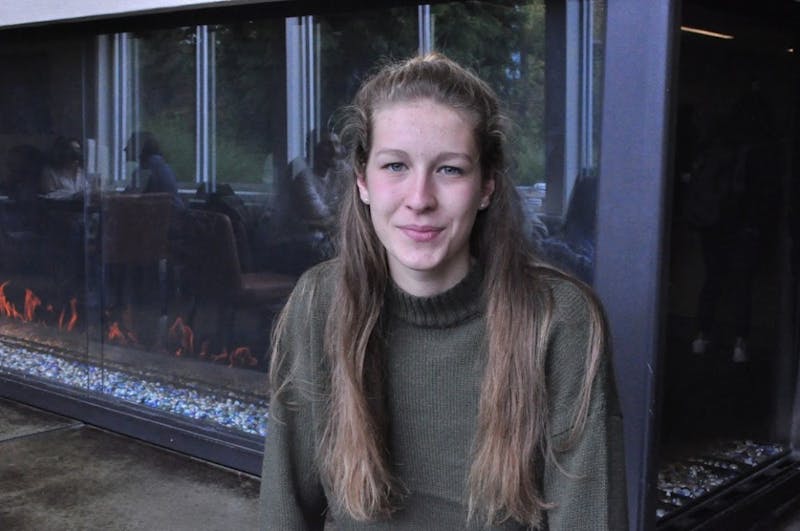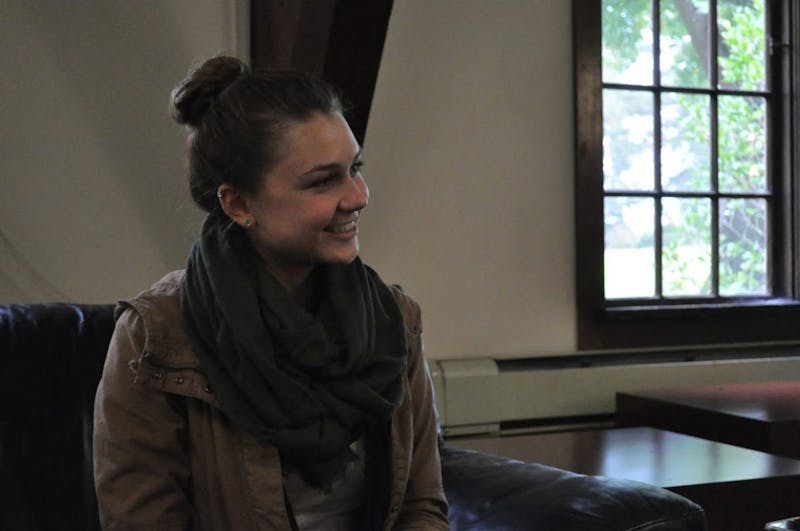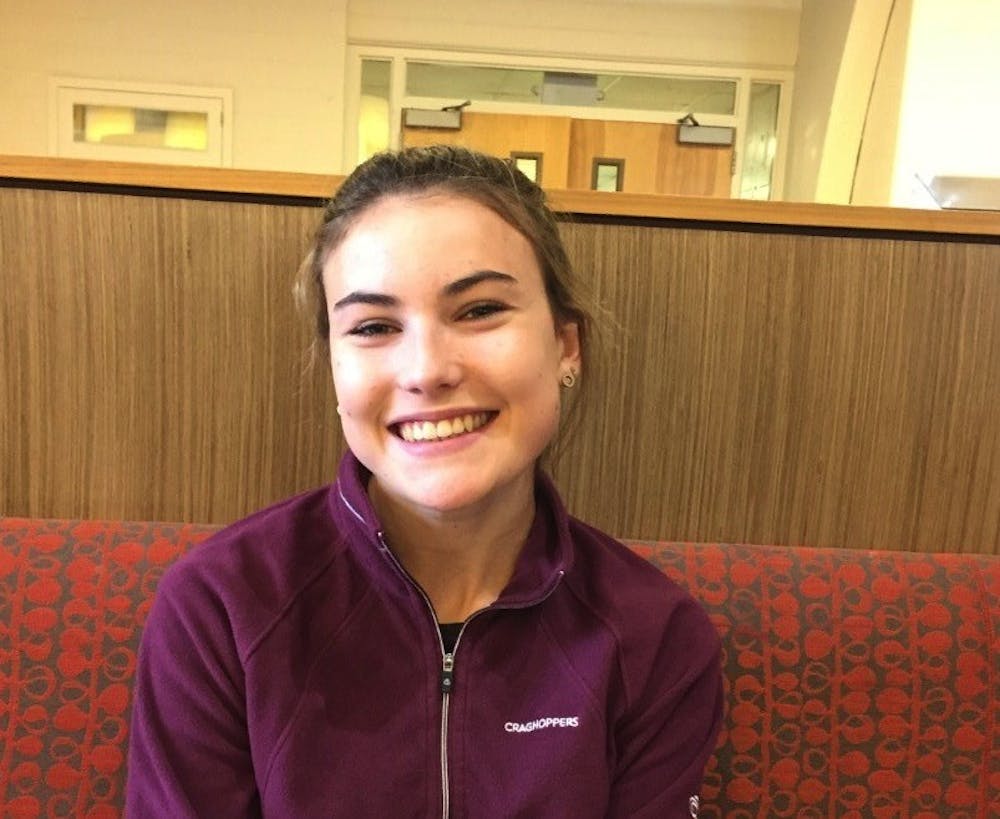Aoibhe Richardson heard about the U.S. election through Facebook videos and memes while she was home in Ireland this summer. The sophomore psychology major says most of these revolved around controversial things Trump has said.
Since coming to Portland, Richardson has not talked about the election a great deal, though she was able to watch part of the first presidential debate.
“All political debates have sly digs and such,” Richardson said, “but (the moderators) didn’t even stop them from butting in or anything, they just let them at it. I suppose it makes it entertaining for people to watch.”
While international students at the University of Portland can’t vote in the election, some remain interested in voicing their opinions on the political situation and in hearing Americans’ thoughts.
Richardson says if she could vote, she would cast her ballot for democratic nominee Hillary Clinton, a voting preference she said she has observed in most of her University of Portland peers. Freshman Susan van Weperen, who is from the Netherlands, and sophomore Alix Ratcliffe, who is from Australia, agreed.
“(Clinton) doesn’t seem like the most likable person, but I suppose she’s a better alternative,” Richardson said. “I wouldn’t be worried about living here for the next (four) years with her as president, let’s just put it that way.”

Ratcliffe also watched part of the first debate, and said it was different than what she would see in Australia, where it is rare that opposing leaders would stand together to argue about policies. Normally, she sees policies explained through TV commercials and one on one interviews with candidates. The media hype over the debate was new to her. Ratcliffe said she knew “something must be up” with this particular U.S. election based on the amount of American election coverage she saw in Sydney before she arrived in Portland in August.
“(Watching the first debate) felt like a very American experience,” Ratcliffe said. “(But) you could tell that this election was different because it was in the (Australian) media so much.”
In general, Ratcliffe feels that people at UP are much more open about politics than in Australia. Voting in Australia is required, with large fines for those who do not vote, but Ratcliffe said generally voting choices are not discussed, even among family.
But Ratcliffe said even her family got into a heated debate about the U.S. election before she left home, which she said is unusual. When the election came up in Australian media as she was preparing to head to the U.S. for school, her extended family voiced their opinions on the American political situation. Her cousin voiced support for Trump because he thinks Trump would accomplish more than Clinton — Ratcliffe, however, says she does not want to see Trump accomplish his goals.
Among friends in Australia, Ratcliffe said the general opinion is very anti-Trump. Upon seeing students wearing Trump t-shirts at UP, she snuck a photo and sent it to her friends.
“It’s so weird that they are proud to be supporting (Trump),” Ratcliffe said, quoting texts received from Australian friends. “They look so happy, and like such nice people, why would they support someone like that?”
Ratcliffe says that a lot of her understanding of Trump as a politician comes from Australian politician Pauline Hanson, who Ratcliffe thinks has similar views. She thinks people who feel like their voices aren’t being heard could vote for people like Trump or Hanson, despite what Ratcliffe sees as their “racist views.”

Richardson, Van Weperen and Austrian engineering student Edwine Lehner have all observed similar voting attitudes among their American peers. The three said they hear people expressing support for Clinton not necessarily because of her policies, but to avoid electing Trump.
“Most people tell me that both are negative, but (Clinton) is better,” Lehner said. “It’s not the best, but she is better than Trump. That’s what I hear.”
Van Weperen, who came to Portland from the Netherlands, has been surprised by the difference between opinions she hears on campus and national poll results.
“Everyone says they are going to vote for Hillary Clinton, and I don’t hear anyone who is for Trump (on campus),” Van Weperen said. “But there are still so many people (in the U.S.) voting for him.”
Like Van Weperen, Richardson says she is surprised that she does not see more Trump supporters, but suggests that perhaps they don’t feel comfortable sharing their political views on campus due to the large number of Clinton supporters. She compared Britain’s decision to leave the European Union (a.k.a. “Brexit”) with Trump supporters in the U.S.
“(I) met a lot of people from the United Kingdom and would ask them if they voted to leave or stay for Brexit, and maybe half would say to leave and half would say to stay,” Richardson said of her summer travels in Europe. “And then the ones that voted to stay would turn around and get kind of angry (at those who voted “leave”). Maybe that’s what is happening here; maybe people are voting for Trump but not discussing it, or not admitting to it.”
Junior Sunshine Huang did not hear anything about the U.S. election when she was home in Nanchang, China last winter break. She notices that young people at UP appear interested and involved in this election, which was not her experience in China. When Huang was in high school she did not hear peers discussing the Chinese presidential election, or preferred candidates, which she attributes to the different political system in China where national leaders are elected indirectly.
Huang also spoke about the challenges for Clinton as a woman in politics. While acknowledging recent improvements, Huang said it has historically been hard for women to be successful in politics in China.
“I know America is kind of different,” Huang said, “but I still feel it would be hard.”
Huang says she would like to see what America would be like with a woman president. There has only been one female emperor in Chinese history.

Lehner feels she has been more aware of this year’s U.S. election than in the past, both at home in Austria and at UP.
“We always hear about the U.S. elections,” Lehner said. “It also affects Europe in a kind of way. This election is very interesting, because the candidates are very interesting.”
Lehner says she would not vote for Trump but, like Huang, would like to read more on the policies of all candidates before making a final decision. Lehner urged all students who can vote to take their ballots seriously.
“I hope that Americans think about the elections and vote for the right person,” Lehner said.








